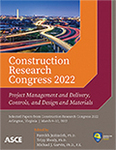A Framework to Measure the Cost of Controversy Surrounding Energy Construction Projects
Publication: Construction Research Congress 2022
ABSTRACT
Energy projects are essential to serving the world’s growing energy demands. However, energy construction projects encounter controversy when the community disagrees with the development process or expected project outcomes. These conflicts can and often do lead to schedule delays and cost overruns, yet energy project developers are rarely prepared to anticipate, mitigate, and respond to arising challenges. With this work, we aim to model the economic consequences of controversy stemming from public opposition to energy construction projects. We propose a framework to determine the potential costs and schedule delays occurring during a project’s timeline. We use a hybrid system dynamics and agent-based modeling approach demonstrated by wind energy construction projects. Developers can use the proposed methodology by inputting their project characteristics to anticipate controversy and mitigate risk through public outreach. The resulting model will serve as a proof of concept that can be expanded upon in future research.
Get full access to this article
View all available purchase options and get full access to this chapter.
REFERENCES
Aitken, M. (2010). “Wind Power and Community Benefits: Challenges and Opportunities.” Energy Policy, 38(10), 6066–6075.
Colvin, R. M., Witt, G. B., Lacey, J., and Witt, K. (2019). “The community cost of consultation: Characterising the qualitative social impacts of a wind energy development that failed to proceed in Tasmania, Australia.” Environmental Impact Assessment Review, 40–48.
Conway, K., and Duguay, M. (2019). “Energy East and Dakota Access: Pipelines, Protest, and the Obstacles of Mutual Unintelligibility.” Journal of Canadian Studies, 53(1).
Coppens, T., Van Dooren, W., and Thijssen, P. (2018). “Public opposition and the neighborhood effect: How social interaction explains protest against a large infrastructure project.” Land Use Policy, 79, 633–640.
Firestone, J., Hoen, B., Rand, J., Elliott, D., Hübner, G., and Pohl, J. (2018). “Reconsidering barriers to wind power projects: community engagement, developer transparency and place.” Journal of Environmental Policy and Planning, Taylor & Francis, 20(3), 370–386.
Fortin, J., and Friedman, L. (2020). “Dakota Access Pipeline to Shut Down Pending Review, Federal Judge Rules.”, New York, New York, USA.
Hoen, B., Firestone, J., Rand, J., Elliot, D., Hübner, G., Pohl, J., Wiser, R., Lantz, E., Haac, T. R., and Kaliski, K. (2019). “Attitudes of U.S. Wind Turbine Neighbors: Analysis of a Nationwide Survey.” Energy Policy, Elsevier Ltd, 134(October 2018), 110981.
IEA. (2020). World Energy Investment 2020. Paris.
Mahato, B. K., and Ogunlana, S. O. (2011). “Conflict dynamics in a dam construction project: A case study.” Built Environment Project and Asset Management, 1(2), 176–194.
Nagel, M., and Satoh, K. (2018). “Protesting iconic megaprojects. A discourse network analysis of the evolution of the conflict over Stuttgart 21.” Urban Studies, 56(8), 1681–1700.
Olander, S., and Landin, A. (2005). “Evaluation of stakeholder influence in the implementation of construction projects.” International Journal of Project Management, 23(4), 321–328.
Sargent, R. G. (2004). “Validation and verification of simulation models.” Proceedings - Winter Simulation Conference, IEEE, 104–114.
Simonelli, J. (2014). “Home rule and natural gas development in New York: civil fracking rights.” Journal of Political Ecology, 21, 258–278.
Sovacool, B., Gilbert, A., and Nugent, D. (2014). “Risk, innovation, electricity infrastructure and construction cost overruns: Testing six hypotheses.” Energy, 74(906–917).
Teschner, B., and Holley, E. (2019). “The cost of mine suspension from social conflict: A decision tree model.” Resources Policy, Elsevier Ltd, (November 2018), 101443.
Walker, C., Baxter, J., and Ouellette, D. (2014). “Beyond rhetoric to understanding determinants of wind turbine support and conflict in two Ontario, Canada communities.” Environment and Planning A: Economy and Space, 46(3).
Watkins, G. G., Mueller, S.-U., Meller, H., Ramirez, M. C., Serebrisky, T., and Georgoulias, A. (2017). Lessons from Four Decades Of Infrastructure Project Related Conflicts in Latin America and the Caribbean.
Information & Authors
Information
Published In
History
Published online: Mar 7, 2022
Authors
Metrics & Citations
Metrics
Citations
Download citation
If you have the appropriate software installed, you can download article citation data to the citation manager of your choice. Simply select your manager software from the list below and click Download.
